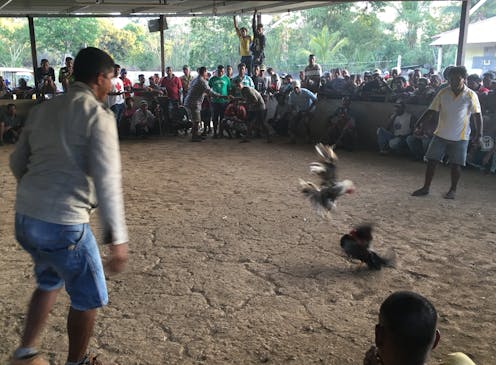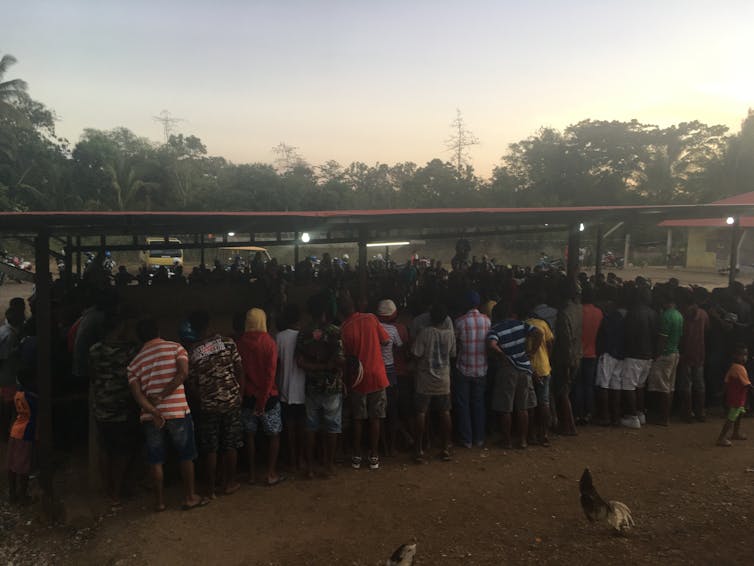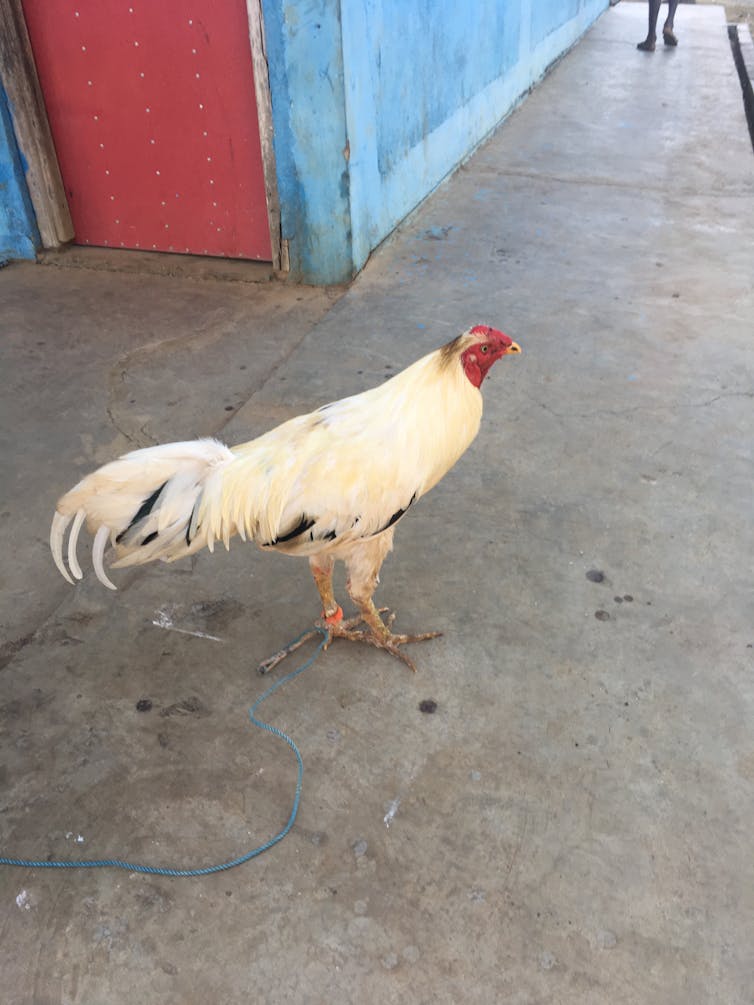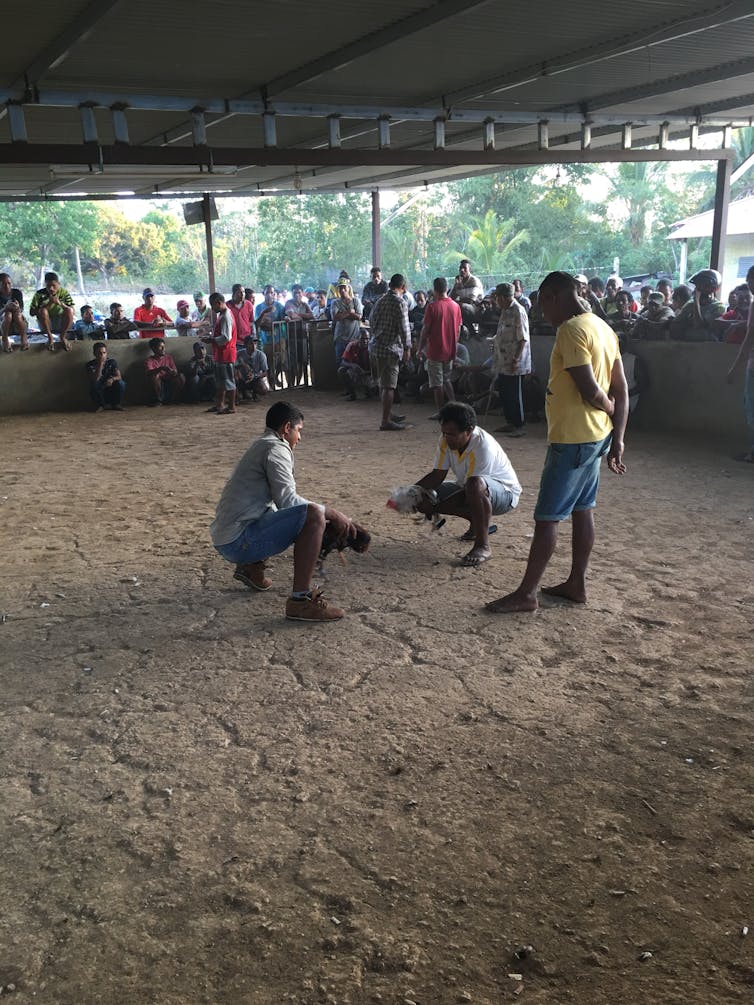Source: The Conversation (Au and NZ) – By Annie Wu, Senior Research Officer, University of Technology Sydney

Annie Yuan Cih Wu, Author provided
The venue is brimming with cheers of excitement from the chicken owners. Despite bets being placed before the game started, the value of a bet can build up as the stronger chicken continues to win.
The atmosphere gets intense.
The brown dirt floor is speckled with red; the smell of this blood mixes with the smoke of cigarettes and floats up to coat the twilight sky.
Blood splashed on the ground by the knife of the winning chicken signifies not only masculinity and competition, but also the efforts dedicated to raising household chickens and the ability to earn an income off bets.
The rule of brutality is the loser cock will also contribute: not through a betting income, but through feeding the family.
In Timor-Leste, cockfighting is a strictly gendered event limited to men. Women are forbidden to attend, embargoed by the culture, but foreign observers – including myself – seem exempt from the rule.
Men’s work
Men gather every afternoon at 6pm in large fields to gamble on cockfighting (futu manu). In one evening, a man can spend from US$10-$200 per game in a country where the median monthly income per household is US$235.
Cockfighting is a cultural practice that has been prevalent in Southeast Asia, South America and the South Pacific for a long time. It is believed to have originated in South Asia before it was introduced into Greece in the time of Themistocles, 524–459 BCE.
Each night there is a series of fights between an agreed number of chickens over several rounds of battles. Each winner chicken will continuously fight to the next round until the ultimate winner is announced.
This traditional cultural activity has been commercialised as a petty cash source and a channel for getting windfalls for Timorese men since the Portuguese colonial era. It is possible to win a few hundred dollars in one day if the fighter chicken is well-trained and strong enough to win several times.

Annie Yuan Cih Wu, Author provided
Loser cocks are frequently disabled, and a small corner is dedicated for them after each round. Owners take them home to serve for dinner. Timorese households rarely consume protein every meal. Especially in rural households, meat is eaten only a few days a week and these chickens form an important part of the diet.
Cockfighting has multiple advantages for a household: nutritional value, potential extra income, the leisure of excitement and a space for men to engage with peers and demonstrate masculinity and power during the game.
Read more:
Before chickens became food for people, they were regarded as special exotica
Women’s work
Chicken selling and dealing is reserved for women to earn petty cash and accumulate private savings.
Forbidding women to participate in cockfighting restricts access to fun and highlights the privilege of its masculine nature. But men are not allowed to sell chickens that belong to their wives, mothers, sisters or daughters: that is the women’s traditional “piggy bank”.
One chicken may sell for US$15-40, and one woman can raise up to seven chickens a year, depending on the available space.

Annie Yuan Cih Wu, Author provided
Permitting only women to be in charge of chicken sales is a security deposit and balancing structure. The family economics cannot be squandered by men’s addiction to cockfighting: the rights of sale are determined by the women.
Men are allowed to keep, train and raise chickens in their own way. They can often be seen exchanging information about their chickens before and after fights. But women are the treasurers in dealing with household chickens.
Community work
For the community, the petty cash spent on cockfighting allows the continuity of a Timorese tradition and supports the local economy. Social and communal relations are sustained and the informal economy is supported: cash stays local and is spent locally.
Cockfighting trading and training require multiple business skills that benefit the livelihoods of participants’ families: developing the system to collect betting cash and issue winners’ takings, running events, facilitating the game and selling cigarettes and drinks.
Yet it exists in a vague and informal economic sphere in Timor-Leste: somewhere between a leisure activity to unwind and a commercial trade to make money.

Annie Yuan Cih Wu, Author provided
Winning incomes feed local households, guarantees cash flow and secures protein intake. It can improve food security and nutrition, and can relate incomes to small business. It is also a form of preserving cultural heritage.
After the last round of cockfighting ends, some men gently hold their winning chickens as if they were babies, carry them in light blue nylon string bags to catch a minivan, or pat them softly while walking them home.
In that moment, I see these cocks are more than a tool of income generation.
They are pets, warriors and royal portrait animals for Timorese households.
Read more:
Twenty years after independence, Timor-Leste continues its epic struggle
![]()
Annie Wu does not work for, consult, own shares in or receive funding from any company or organisation that would benefit from this article, and has disclosed no relevant affiliations beyond their academic appointment.
– ref. Cash for the winner, the loser for dinner: cockfighting in Timor Leste is a complicated game – https://theconversation.com/cash-for-the-winner-the-loser-for-dinner-cockfighting-in-timor-leste-is-a-complicated-game-131027




